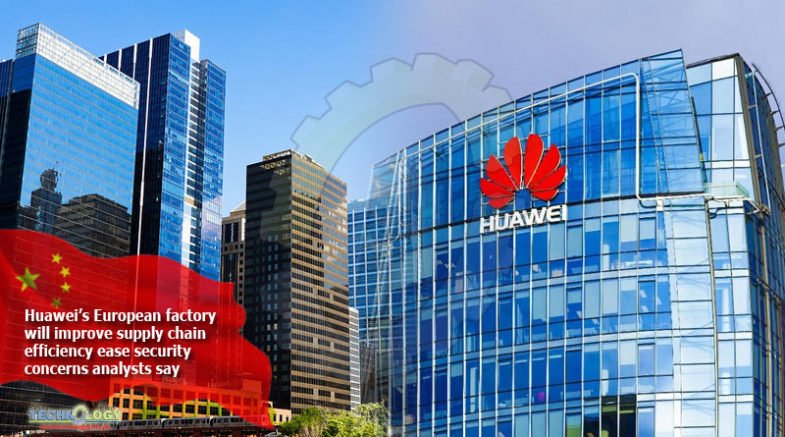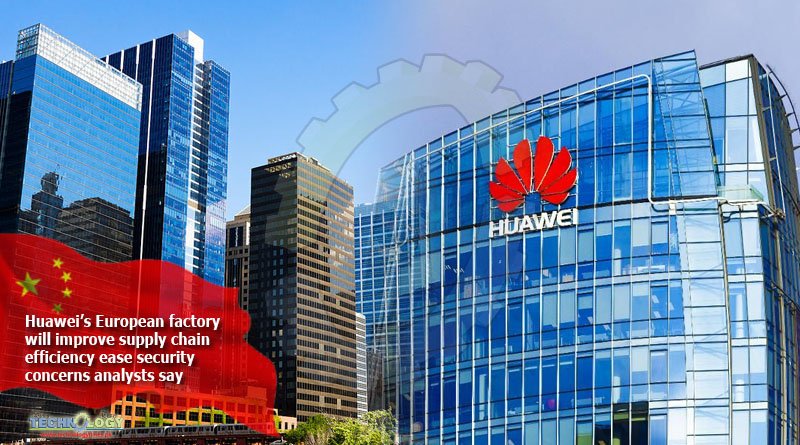Huawei Technologies’ plan to build a factory in France to produce 4G and 5G wireless equipment will help the Chinese company get its supply chains nearer telecommunications carriers in Europe, while limiting concerns over alleged spying for the Chinese government, according to analysts.

The Shenzhen-based company, the worlds’ No 1 telecoms equipment supplier, last Thursday announced it would invest more than 200 million euros (US$219 million) in the factory to meet the needs of its European customers even as the US has repeatedly warned allies not to allow the company into the continent’s 5G infrastructure.
This was the continuity of a long expansion plan in Europe, Huawei’s second-largest market after China, said Stéphane Téral, executive director of telecommunications research at IHS Markit.
“At this stage of the mobile industry, it is critical [for Huawei] to have a radio communications factory somewhere in Europe to relieve the pressure on the existing ones in China,” he said. “And we clearly see firsthand the disruption the coronavirus crisis is creating.”
The European facility will improve Huawei’s efficiency because the company will be able to integrate itself into the supply chain in Europe, said Peter Liu, vice-president at Gartner’s technology and service provider research group.
Huawei to build first European 5G factory in France to soothe Western nerves28 Feb 2020
Huawei said it chose France for the factory because of the country’s ideal geographic position on the continent, mature industrial infrastructure and a highly educated labour pool.
“This manufacturing plant will add to Huawei’s integrated value chain within Europe, improving the timeliness and reliability of Huawei’s deliveries to European customers,” the company said in a statement.Inside China Tech NewsletterGet updates direct to your inboxBy registering, you agree to our T&C and Privacy Policy
China and the US are locked in a titanic battle over leadership in the 5G race, with the winner likely to benefit from billions of dollars worth of economic benefits. With peak data rates up to 100 times faster than what current 4G networks provide, 5G wireless networks will form the connectivity backbone for a host of industrial Internet of Things applications that leverage big data, including artificial intelligence-powered manufacturing, smart cities and autonomous cars.
UK allows Huawei to help build its 5G network despite US warnings of national security threat
Huawei has come under intense scrutiny amid the US-China tech war, leading to the company being added to Washington’s so-called Entity List last May over national security concerns. The trade blacklist means Huawei cannot buy American components and software.
Washington wants Huawei’s gear excluded from upcoming advanced 5G mobile networks, saying the company poses a security threat because China’s intelligence law compels companies and individuals to pass on information if requested by Chinese intelligence services.
Huawei has repeatedly said it would never share customer data with Beijing.
Given that Huawei is locked out of the US market, Europe has become a major battleground for the Chinese company. It has secured 91 commercial 5G contracts worldwide, of which 47 are from European telecoms operators, including Spain’s Telefonica, Sunrise of Switzerland and the Dutch company KPN, said Ryan Ding, president of Huawei’s carrier business group, at a media event in London last month.
US charges Huawei with racketeering, doing business in North Korea14 Feb 2020
“European operators are still choosing vendors. If Huawei builds a local factory, it is easier to eliminate their concerns [on security]. It will be
less offensive if there is local staff [working in Huawei],” said Gartner’s Liu.
The choice of France is a “logical” one, Téral said, as the company already operates five research & development centres in the country: “France is at the centre of the region, has advanced manufacturing technologies and a highly educated workforce that Huawei can tap into” he said.
Téral added that mobile operators who want to deploy Huawei radio products in France need to ask ANSSI (Agence Nationale de Sécurité des Systèmes d’Information) for authorisation, so they have independent vetting of Huawei’s equipment.
Huawei has been trying to brand itself as a global company rather than a strictly Chinese company and its investment in France will help that effort, according to Liu.
Once up and running, its new facility will produce 1 billion euros’ worth of products annually and directly create 500 jobs, according to Huawei.
At the end of January, the British government approved the limited use of Huawei’s equipment in the country’s roll-out of 5G mobile networks, opening the door to rival European telecoms gear suppliers Ericsson and Nokia.
While the decision imposed a cap on Huawei’s market share in Britain, it was not welcomed by the Trump administration which had been pressuring London to block Huawei. However, the UK decision could serve as a model for other European governments, including Germany, as they prepare to make similar decisions over their 5G mobile infrastructure.
